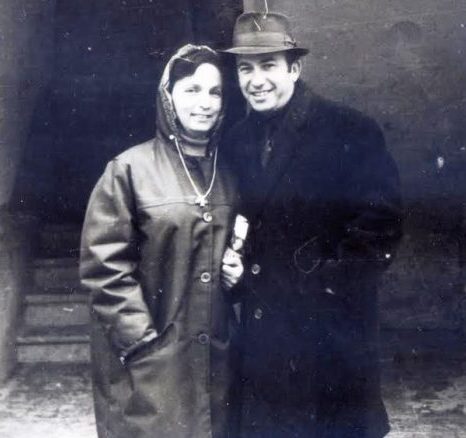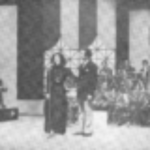The 11th edition of the Festival of Song (Festivali i 11të i Këngës) took place on December 22-25, 1972 in Tirana, Albania. It was by far the most popular music event in Albania since it began in 1962. The festival was produced by the only national television channel (Radio Televizioni Shqiptar -RTSH) and it introduced the entire catalog of pop music that could be played on the national airwaves the following year to the Albanian public.

Image from telegrafi.com
By 1972, the newly appointed RTSH director Todi Lubonja – a passionate communist educated in Hungary – had begun a reform campaign to bring TV programing up to an international standard. Albanian television was still in its infancy with merely 4.5 hours of daily programing. Drawing inspiration from foreign broadcasts Lubonja’s team was the first to introduce international soccer matches and foreign films to programming, all with the approval of the cultural leadership.
These influences were apparent in the style of the 11th Festival, which was tailored after the Italian Festival of Sanremo. Unlike previous editions, in 1972 the pervading theme was love and most lyrics were completely free of political references; the style of the performers was modern, as was their stage presentation. According to Skifter Kellici, an Albanian writer who worked under Lubonja at the time, conservative voices complained about the fashion of the performers in the media immediately. This was routine for any cultural event at the time and the organizers dismissed them. After all the festival itself mirrored the modern fashion[1] of Tirana at the time, including that of many of the children of the leadership of the PPSH themselves. The festival was praised by the media and party leaders and largely considered a huge success.
The atmosphere of celebration began to change three weeks after the festival when the youth newspaper Zeri i Rinise (The Voice of Youth) published a letter submitted by a rural youth group complaining about “revisionist behavior” exhibited in the festival. Weeks later, when Enver Hoxha addressed the parliament on January 9th and pointed to the festival as an example of a dangerous liberal movement developing in Albania.[2] Unlike other Hoxha speeches this address was relatively bare and pointed, intent on exposing this supposed dangerous liberal trend in the arts. This speech set the ideological groundwork for the massive campaign that followed in the mid 1970s, and it set the tone for the remaining years of Hoxha’s life and political power. (Hoxha: vol.50,4-5)

The first part of the January 9th speech read as a love note to Albanian cultural traditions and as is frequently the case in European nationalist discourse, a celebration of rural peasant culture. Hoxha juxtaposed what he identified as traditional values against a new enemy: a group of anonymous artists and administrators of Albanian media, who according to Hoxha were producing work riddled with foreign liberal elements. According to Hoxha they dismissed critics as conservative and “hid behind the word innovators, falsely claiming that liberalism was what the youths wanted”. (Hoxha: vol. 50,13)
POLITICAL PURGES
The following step in the campaign against the new enemy of liberal elements came in March of 1973 during a session of the PPSH Central Committee[4]. In no uncertain terms Hoxha attacked liberalism, which had by this time become a pervasive problem infecting all aspects of Albanian life. He began with harsh criticism against liberal behavior, now in the military. “These are entirely foreign displays[5] for us, we’ll have to fix them, to clean them out, to make them disappear. They endanger the concept of bravery itself and the protection of the nation”. (Hoxha: vol 50, 296).
Hoxha did not explain how exactly liberal behavior exhibited itself in the army, but over the following years many leading figures were identified as liberals and either fired, interned, and a some executed. Suddenly Albania was at war against liberalism. At this point, even pondering that conservative values might be dangerous to progress was tantamount to treason.
“…Fadil Pacrami and others, are apparently losing sleep trying to figure out which is the main actual danger, conservatism or liberalism? The party has said repeatedly that both are dangerous that we must fight both sides, and it has done this….But do these short minded comrades want us to admit that the main actual danger is conservatism? Sorry, but this is the thesis of the enemy. We must ask these comrades, “are you with the thesis of the Party, or the enemy of class?”
Hoxha: vol 50, 296
Immediately after this speech Fadil Pacrami was relieved of his position as Secretary of Culture. Later, in 1975, he was arrested and imprisoned for 18 months. In 1977 he was declared an enemy of the state and imprisoned for 25 years.[6] Todi Lubonja was relieved of his post as Director and ultimately declared enemy of the state and imprisoned years later. By the end of the year, several cultural leaders were imprisoned, and the career of most of the artists involved in the festival ended abruptly. (Kellici: 58) Identifying the new liberal enemy and shfaqje te huaja (foreign displays) was only the first step in a series of reforms that eventually led to the complete, political, social, cultural and economical isolation of Albania from the rest of the world.
The official end of the emancipation movement
The second step came over the following years with the military reforms in 1974 and finally cemented in the 1977 revised constitution which declared illegal all forms of religion, and gave the PPSH complete control over all facets of Albanian life. The reforms that followed the 11th Festival also marked a permanent change of direction in the women’s emancipation, cementing conservative patriarchal values. As the anti-liberal rhetoric became increasingly more aggressive and conservative values celebrated, women’s emancipation all but disappeared from the national conversation.
In a meeting of the Party leadership in 1976, Hysni Kapo – Hoxha’s right hand man – reported on numbers of communist membership: “we increased admission, especially during the period when the complete emancipation of women was a central issue.”[7] (Hoxha: vo.60, p60) Women’s emancipation was now a thing of the past.
It is important to note that in this meeting Enver Hoxha encouraged the use of public opinion as a major factor in admitting new communist to the ranks. Opinion, a vague but easily identifiable practice, was especially hard on women’s appearance and sexual behavior.[8] Without much fanfare women’s emancipation was declared a success and was no longer a priority. The introduction to the new constitution of 1974 read, “The peoples’ live power has been freed and its unending creative energy has exploded. The Albanian woman, in the perpetual revolutionary process has earned equality in all fields, and has become a great social force, marching towards her complete emancipation.[9]
But in reality ethe political oppression and fight against foreign behaviors, Hoxha’s official call to place value on public opinion to fight the liberalism were particularly oppressive on Albanian women. The official end of women’s emancipation put an end to the campaign against conservative patriarchal values. While the official emancipation movement had provided many Albanian women with opportunities, it had done little to help many other Albanian women achieve equality. Many regional, religious, socioeconomic, and ethnic backgrounds kept women from taking advantage of new opportunities. The official embracing of conservative values placed many of them in a vulnerable position, especially after the festival. Festivali11 works to collect the diverse experiences of Albanian women to provide a space where they can construct their own narratives, to complicate official and mainstream narratives about life under Hoxha’s regime.
[1] “The truth is that in the presentation, especially the performers’ costumes, especially the female singers wearing long dresses and large earrings and rings, many viewers, especially conservatives, voiced displeasure. But since such fashion, as we said, was seen on the sidewalks of Tirana, and what’s more on the children of the leadership of the Party, these complaint left no impression on the overwhelming majority. P. 56 Këlliçi, Skifter. 2003. Historia e Radio-Televizionit Shqiptar (1938-1990). Tiranë: Botim TPE.
Original: “Pra, e vërteta është që për paraqitjen e jashtme, kryesisht për veshjen e këngëtareve, me fustane të gjata, vathë e unaza nëpër gishtërinj, shumë nga teleshikuesit, kryesisht ata konservatorë, të shfaqnin pakënaqësi. Por, duke u nisur nga fakti se veshje të tilla, siç thamë, kishin nisur të shiheshin edhe nëpër shëtitoret e Tiranës, aq më tepër nga fëmijët e udhëheqësve, kjo nuk bëri përshtypje aq të madhe te pjesa tjetër, shumë më e madhe.”
[2] The speech was titled: The Development of Literature and the Arts Must be at War Against Every Foreign Ideological Influence.
[3] “We have struck hard conservatism and different traditions of life. But he still has deep roots and is still heavy, especially in the life of women and the youth.”
Original: “Ne e kemi goditur me force konservatorismin edhe ne traditat e zakonet e ndryshme te jetes. Por ai I ka rrenjet akoma te forta dhe peshon akoma rende sidomos ne jeten e grave e te rinise.” (Hoxha: vol. 50,13).
[4] The speech was titled, How we must understand and fight the imperialist trap on our country and its pressure on us. Original: Si duhet kuptuar dhe si duhet luftuar rrethimi imperialist-revizionist i vendit tone dhe efekti i presionit te tij mbi ne.
[5] The term was shfaqje te huaja – Shfaqje in Albanian roughly means behavior that is revealing.
[6] An interview conducted by the Albanian Center for Rehabilitation and Trauma with a high official of Sigurimi – the Albanian secret service – reveals that Hoxha personally chastised the secret service for not having discovered these enemy elements.
[7] Original: Pranimet I kemi intensifikuar sidomos ne periudhen kur u ngrit problem I emancipimit te plote te gruas.
[8] For more on how the “opinion ”plays into gender relations in Albania, see Nicola Nixon’s analysis of the idea of “shame”. Nicola Nixon (2009) ‘You can’t eat shame with bread’: gender and collective shame in Albanian society,Southeast European and Black Sea Studies, 9:1-2, 105-121
[9] Original: U cliruan forcat e gjalla te popullit dhe shperthyen energjite e tij krijuese te pashtershme. Gruaja shqiptare, ne procesin e panderprere te revolucionit, fitoi barazine ne te gjitha fushat, u be nje force e madhe shqerore dhe shkon drejt emancipimit te saj te plote.